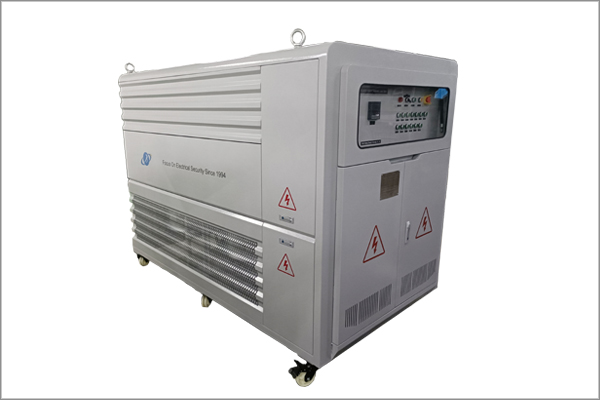Why do diesel generators need to be load bank test?
Time:2024-09-14
Diesel generator, as the main component of emergency backup power system, assumes the important responsibility of ensuring power supply at the critical moment. However, since diesel generators are used relatively infrequently, their performance can be affected by prolonged idling. Therefore, regular load bank testing is essential to ensure the reliable operation of diesel generators. This article will explore several aspects of why diesel generators need to perform load bank testing.
1000kW load bank
First, verify the overall reliability
In an emergency, backup generators need to be able to start up quickly and provide stable power to prevent potentially catastrophic loss of function and data. Load bank testing is a method of simulating actual working loads in a controlled environment to verify the ability of a diesel generator to operate at full rated kW output. Through load bank testing, you can ensure that the generator can respond quickly when needed, and continue to provide stable power to meet the power demand.
2. Prevent carbon accumulation
Diesel generators are prone to carbon deposition when they are idle for a long time or run at low load. Carbon accumulation is the accumulation of unburned fuel and soot in the engine exhaust system, and these deposits can impair the efficiency and service life of the engine, and even pose a fire hazard. Load bank testing allows the engine to reach its full operating temperature, thus burning off accumulated fuel and soot and preventing the formation of carbon deposits. This not only ensures cleaner and more efficient operation of the engine, but also extends its service life.
Third, improve system performance
Load bank testing is not only concerned with the start-up and power supply capability of the diesel generator, but also involves a comprehensive evaluation of the performance of the entire system. During the test, key engine parameters such as oil pressure, engine temperature, fuel pressure, etc. can be monitored and recorded. This data helps technicians analyze the performance of generators under different load conditions and identify and resolve potential problems in a timely manner. Regular load bank testing ensures that the generator and its supporting equipment can work together to provide a stable power output in an emergency.
4. Meet environmental protection requirements
With the increasingly stringent environmental regulations, the emission performance of diesel generators has received more and more attention. Load testing bank helps to assess the emissions of the generator under different load conditions to ensure that the emissions comply with the relevant environmental standards. Through regular testing and adjustment, the emission level of the generator can be reduced and the impact on the environment can be reduced.
5. Improving economic performance
Although load testing requires a certain amount of time and cost investment, in the long run, the economic benefits it brings are significant. By identifying and resolving potential problems in a timely manner, power outage losses and maintenance costs due to generator failure can be avoided. In addition, load bank testing can improve the operating efficiency and service life of generators, reducing overall operating costs.
conclusion
In summary, load bank testing of diesel generators is an important means to ensure reliable operation, prevent carbon accumulation, improve system performance, meet environmental requirements and improve economic efficiency. Therefore, it is recommended that all diesel generator users include it in their maintenance plan and carry out regular testing in strict accordance with the regulations. Only in this way can we provide a solid guarantee for power supply at critical times.
News Recommendation
-
 2024-09-11
2024-09-11TRIUMPH LOAD EXHIBITING AT Enlit Europe 2024 -BOOTH 7.H08
-
 2023-04-21
2023-04-21TRIUMPH LOAD EXHIBITING AT DATA CENTER WORLD GERMANY 2023-BOOTH F909
-
 2023-04-06
2023-04-06TRIUMPH LOAD EXHIBITING AT ELECTRIC POWER TECH KOREA 2023 – Booth G109
-
 2022-05-05
2022-05-05What is the role of ac load bank for power supply?
-
 2022-05-05
2022-05-05What is the role of the load bank?


